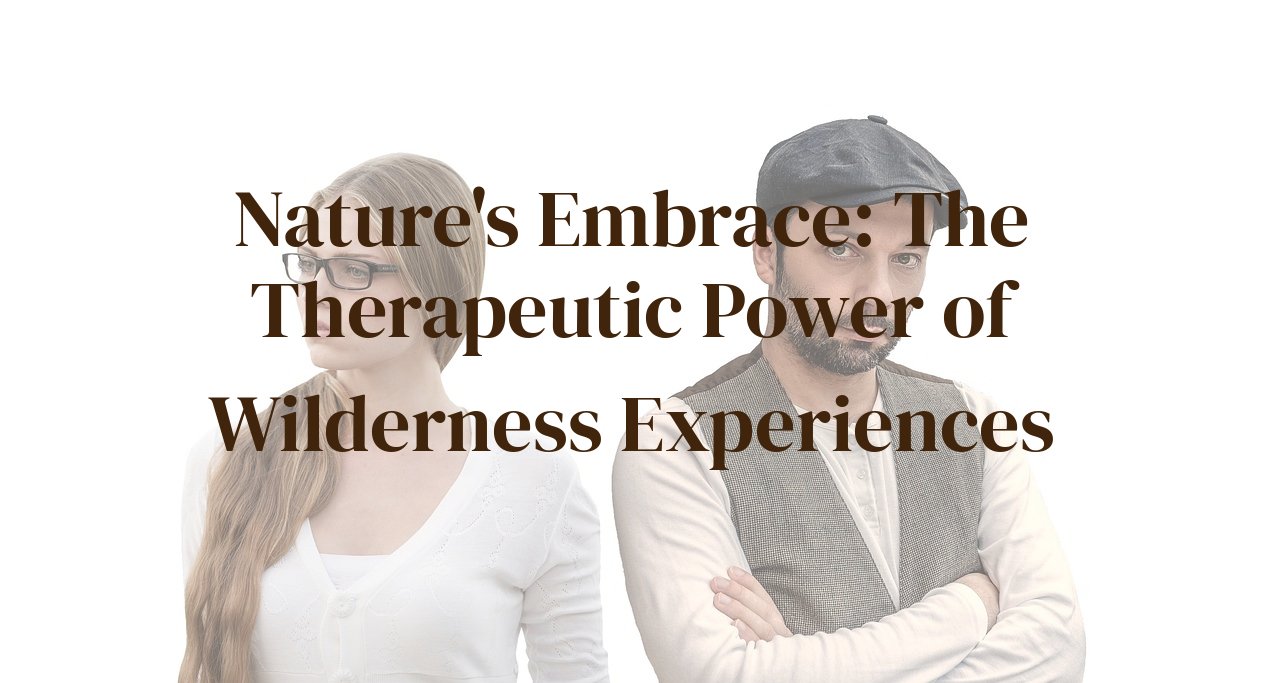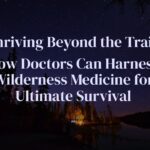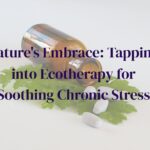
Imagine a therapy session without walls, where the rhythmic sounds of nature and the fresh scent of pine are your companions. This post delves into the astonishing healing potential of eco-therapy, exploring how immersing oneself in the wilderness can foster mental, emotional, and even physical well-being.
Through this comprehensive guide, you’ll discover the science behind eco-therapy, personal anecdotes of transformation, and practical tips on how you can integrate these wilderness experiences into your own life for sustainable mental health benefits.
Table of Contents
The Science Behind Eco-Therapy
Diving into the realm of eco-therapy unveils a fascinating intersection between nature and human well-being. Modern scientific studies have begun to illuminate how wilderness experiences can catalyze profound healing processes. Let us delve into some of these compelling discoveries.
One significant scientific finding is the concept of biophilia, proposed by the biologist E.O. Wilson. Biophilia suggests that humans have an innate affinity for nature, a genetic predisposition shaped through millions of years of evolution. This connection manifests as a sense of well-being and psychological relief when we immerse ourselves in natural environments.
Research has also quantified the impact of nature on stress reduction. Studies utilizing physiological markers such as cortisol levels, heart rate variability, and blood pressure have demonstrated that spending time in green spaces can significantly lower stress indicators. For instance, a Japanese study on ‘forest bathing,’ or Shinrin-yoku, showed that participants experienced reduced cortisol levels after just 30 minutes in a forest setting.
Moreover, exposure to natural settings has been found to enhance cognitive function. The Attention Restoration Theory (ART) posits that natural environments replenish our cognitive resources by providing soft fascinations—gentle, undemanding stimuli that effortlessly capture our attention. This effect is particularly beneficial in an era marked by constant digital distractions.
The immune system also reaps benefits from wilderness exposure. Phytoncides, organic compounds released by trees, have been shown to bolster natural killer (NK) cell activity, which plays a crucial role in combating infections and cancer. A study even demonstrated that spending two days in a forest elevated NK cell activity for up to a week.
Beyond physical health, there’s intriguing evidence about nature’s role in social bonding and community cohesion. The Social Ecology Theory suggests that shared outdoor activities can strengthen social ties, promoting a sense of belonging and mutual support. This can be particularly therapeutic for individuals suffering from loneliness or social anxiety.
On a psychological level, eco-therapy taps into transcendental experiences. Wilderness adventures often evoke awe, a profound emotional response associated with perceiving something vast and beyond oneself. Awe has been linked to enhanced well-being, increased humility, and heightened life satisfaction.
Throughout my career, I’ve witnessed the transformative power of nature firsthand. One poignant memory involves a patient who struggled with chronic anxiety and depression. Conventional therapies had limited success, but a structured program of guided nature walks and camping trips brought unprecedented relief. The change was palpable—his mood lifted, sleep improved, and he discovered a renewed sense of purpose.
In essence, the scientific foundation of eco-therapy is both diverse and robust, encompassing physiological, cognitive, social, and emotional dimensions. As our understanding deepens, it becomes increasingly clear that connecting with nature is not a luxury, but a vital component of holistic health.
Mental Health Benefits of Wilderness Experiences
The mental health benefits of wilderness experiences are profound and multifaceted. Imagine stepping away from the cacophony of urban life and immersing yourself in nature’s vast, tranquil embrace—what you feel almost instantly is a wave of calm washing over you. This isn’t just a fleeting sensation; scientific studies back it up.
First, spending time in the wilderness significantly reduces stress levels. The natural environment exposes you to fewer stressors, allowing cortisol levels to drop. Whether it’s the soothing sound of rustling leaves or the sight of a serene lake, nature has a way of calming an overactive mind.
Second, exposure to natural environments has been linked to improved mood and emotional well-being. Nature acts as a natural antidepressant, lowering incidences of anxiety and depression. A long walk through a forest or a hike up a mountain can release endorphins—the body’s natural feel-good chemicals.
Third, being in nature enhances mental clarity and focus. Without the constant bombardment of digital distractions, your brain has the opportunity to reset. Many people find that they return from wilderness trips with enhanced problem-solving skills and a clearer perspective on life.
Personal anecdote: ‘I remember my first solo camping trip vividly. Struggling with anxiety and perpetual burnout, I decided to spend a weekend in the woods. The first night was terrifying, but when morning came, the sight of the dew-kissed meadow bathed in early sunlight made me realize that nature offers a kind of therapy that urban environments simply can’t.’
Wilderness experiences also promote mindfulness and a deeper connection to the present moment. When you’re in the wild, you can’t help but pay attention to your surroundings—the chirping of birds, the flow of a stream, or the rustle of leaves underfoot. This heightened awareness brings a sense of peace and fulfillment that is often hard to find in daily life.
Finally, communal wilderness experiences can strengthen social bonds. Whether you’re hiking with friends or joining a guided tour, shared experiences in a natural setting foster a sense of community and belonging. These interactions are less superficial than urban social encounters, creating lasting, meaningful relationships.
Therefore, the mental health benefits of wilderness experiences are not just theoretical; they are palpable and life-changing. By reconnecting with nature, you reclaim a part of yourself that is often lost in the hustle and bustle of modern life. So take that step into the wild—you owe it to your mental well-being.
Eco-Therapy and Physical Well-being
It is something when the chill of a morning mist kisses your cheeks that your body truly awakens. Eco-therapy reveals its magical promise not just to the mind, but to the entire physical entity thriving in the natural realm. From the rugged trails of the mountains to the serene retreat of a forest, the wilderness delivers a symphony of health benefits that our bodies desperately merit.
Firstly, and foremost, cardiovascular health enjoys an impressive boost. Engaging in activities such as hiking, walking, or even gentle meandering through the woods propels our hearts into rhythmic labor. The natural terrain, with its undulating paths and varied surfaces, ensures that every muscle group is earnestly employed. My own hikes introduced me to a newfound endurance, a stamina that built up week after week, translating to an overall healthier heart.
The body’s immune system too receives a mystical, yet scientific, enhancement upon exposure to nature. The phenomenon of ‘biophilia,’ our innate connection to natural environments, engages our senses, triggering a cascade of positive biochemical reactions. Phytoncides, essential oils exuded by trees and plants, have been shown to boost white blood cell activity, fortifying our defenses against infections and diseases.
Let’s speak about the act of breathing in the pristine wilderness air. The respiratory system thrives on such an elixir. Far removed from urban pollutants and allergens, the lungs rejoice in the pure oxygen, enhancing their capacity and function. I recollect standing on a snow-clad peak, drawing in lungfuls of crisp air, feeling it invigorate my very core. Pollution-induced asthmatic symptoms feel like a distant memory when one continually indulges in nature’s sanctuary.
Additionally, being enveloped by nature fosters a rejuvenation of sensory-motor functions. The unpredictability of the terrain requires acute awareness and motor coordination, addressing elements of balance, agility, and proprioception. This consistent engagement reflexively sharpens our neuromuscular functions. Personally, my once frequent sprained ankles became a rarity after consistently navigating through rock-strewn paths.
Sunshine, another blessing of wilderness, becomes therapy in itself. Absorbing sunlight, we enable the synthesis of vitamin D, which is paramount for bone health, immune function, and mood regulation. Moderation is key, of course, but basking in the gentle caress of the sun under a forest canopy feels like absorbing nature’s own multivitamin.
To conclude, eco-therapy doesn’t just heal – it transforms. The tangible physical benefits weave seamlessly into our overall wellness fabric, entwining with the mental in a harmonious balance. Take a step into the wild. Feel your pulse sync with the natural heartbeat of the world, and embrace the physical renaissance that follows.
Personal Stories of Transformation
The moment I stepped into the whispering woods, the weight of the world seemed to lift from my shoulders. It was a journey of self-discovery I hadn’t anticipated. In the heart of nature, I found a profound connection between the wild spaces and my own inner peace. Let me share with you some real-life transformations that underscore the potent healing power of eco-therapy.
Jane’s Journey to Self-Belief
Jane, a corporate executive, once confided in me about her overwhelming stress and anxiety. A weekend retreat in the forests became her turning point. The sheer simplicity and raw beauty of the wilderness provided her with an unexpected sense of clarity. She fostered a deeper connection with herself, unwinding years of pent-up frustration. Each rustling leaf and chirping bird seemed to whisper encouragement, enabling her to rediscover her self-worth. Post-retreat, Jane became a staunch advocate for regular nature breaks, firmly believing that nature’s embrace reshaped her perspective on life.
Mark’s Battle with Depression
After years of battling depression, Mark found solace in the mountains. Initially skeptical, he accompanied his friends on a hiking trip. The initial challenge of the steep trails turned into a metaphorical journey of climbing out of his emotional depths. Each step, though arduous, was a testament to his resilience. By the time he reached the summit, Mark felt a triumphant surge he hadn’t experienced in years. The wilderness, with its vastness and tranquility, became a sanctuary where he could process his emotions and regain his footing in life.
Maria and the Healing Ocean
For Maria, the ocean was a balm for her soul. Struggling with grief after losing a loved one, she found it hard to navigate her daily life. A friend suggested a coastal retreat. The rhythmic waves and the salty breeze offered a gentle, yet potent, therapy. The ocean’s ebb and flow mirrored her own pain and healing process. Each sunrise over the water became a symbol of a new beginning. Gradually, Maria felt the heavy clouds of grief lifting, replaced by a renewed appreciation for life’s fleeting moments.
Personal Reflections
Personally, my transformative moment came during a solo camping trip in a secluded forest. The symphony of nature at night, from the hoot of an owl to the rustling of leaves, became my lullaby. It wasn’t just the break from technology and the daily grind; it was the realization that in nature, we return to our truest selves. The wilderness humbles us, teaches us resilience, and offers us an unfiltered mirror to our souls. These personal transformations, including my own, are compelling testimonials to the incredible healing potential of eco-therapy. Whether you seek to mend a fractured heart, find clarity in confusion, or simply reconnect with yourself, nature awaits with open arms.
Practical Tips for Your Own Wilderness Journey
Embarking on a wilderness journey can be a truly transformative experience. Having ventured into nature myself numerous times, I have gathered some practical tips to help you make the most of your adventure.
Choose the Right Location: Selecting a destination that resonates with you personally is crucial. Whether it’s a majestic mountain range, a serene forest, or a secluded beach, your connection to the environment will enhance your overall experience. Research various locations to find one that suits your preferences and abilities.
Pack Wisely: Packing can make or break your journey. Bring essentials such as a first-aid kit, adequate clothing, and sufficient food and water. Depending on your location, you might also need bug repellent, a reliable map, and navigation tools. Make a checklist to ensure nothing is left behind.
Plan Your Route: Have a clear idea of your route before setting out. Familiarize yourself with the trails, camping spots, and water sources. Download offline maps and let someone know your itinerary for safety reasons. This groundwork can prevent unnecessary stress and help you enjoy the journey more fully.
Embrace the Digital Detox: One of the most impactful aspects of a wilderness experience is the opportunity to disconnect from technology. Leave your devices behind or switch them to airplane mode. Immersing yourself in nature without constant digital interruptions allows for deeper reflection and mindfulness.
Prepare for Weather Conditions: Always check the weather forecast before heading out. Nature can be unpredictable, and it’s best to be ready for all conditions. Layered clothing, waterproof gear, and proper footwear will help you stay comfortable and safe regardless of the weather.
Practice Leave No Trace Principles: Respecting nature is paramount. Carry out all your trash, minimize campfire impact, and stick to established trails. Observing these principles ensures that wilderness areas remain pristine for future visitors.
Stay Hydrated and Nourished: Proper hydration and nutrition are vital during any outdoor adventure. Bring along high-energy snacks like nuts, dried fruits, and energy bars. Ensure you have enough water or a means to purify natural water sources along your route.
Listen to Your Body: Pushing your limits can be exhilarating, but it’s essential to listen to your body’s signals. Take breaks as needed, and do not hesitate to turn back if you’re feeling unwell or overwhelmed. Your well-being is more important than reaching a specific destination.
Keep a Journal: Documenting your thoughts and experiences in a journal can deepen your connection to the journey. Record the sights, sounds, and feelings you encounter. Over time, this journal can serve as a cherished reminder of your wilderness adventures.
Connect with Fellow Adventurers: Solo trips offer solitude, but connecting with other adventurers can enrich your experience. Share stories, offer and receive tips, and build a sense of community. The bonds formed in nature can be incredibly meaningful and enduring.
As someone who finds solace and inspiration in nature, I cannot emphasize enough the importance of preparation and mindfulness. By following these tips, you can create a fulfilling and healing wilderness experience that you’ll treasure forever.
Conclusion
Embarking on a journey into the wilderness is more than just an escape from the hustle and bustle of daily life; it’s a path to holistic well-being. By integrating eco-therapy into your life, you open a door to profound healing and personal growth. Remember, nature is always there to embrace you with open arms.



